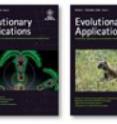A fisheries catch-22
Human impacts on the environment have reduced populations of wild species to dangerously low levels. Nowhere is this more apparent than in worldwide fisheries, where thanks to overfishing and habitat destruction, countless species and populations of fish are on the brink of disappearing forever. To attempt to mitigate the dire situation, captive breeding, the controlled breeding of organisms in protected environments, is regularly initiated. Despite its popularity, does captive breeding actually work? In the current issue of Evolutionary Applications (1:4), Dr. Dylan Fraser of Dalhousie University provides a candid look at whether these breeding programs are fulfilling their mandates.
Using salmonids (the economically crucial group of fish that include salmon and trout) to illustrate his point, Fraser questions whether captive breeding is doing more harm than good. In his comprehensive review of over 300 papers, Fraser concludes that fish reared in captivity can rapidly lose the genetic diversity needed to adapt and survive in the wild, and that the rate of loss of diversity can both vary across breeding programs and be species specific. To complicate matters further, Fraser points out that that we simply do not know how captive-bred fish will perform once released back into the wild.
Unfortunately, without captive breeding to bolster their numbers, we may soon have too few individuals from which to repopulate disappearing fish populations, leaving us essentially in a fisheries catch-22.
Fraser concludes that not only do more data on the effects of captive breeding on the genetic diversity of fishes need to be collected, but also that alternatives to captive breeding, such as the live freezing of fish sperm of diverse genetic backgrounds, or the physical relocation of fish populations from one site to another, need more serious consideration.
Source: Wiley-Blackwell
Other sources
- Conserving biodiversity or plundering genetic diversity? What is captive breeding doing to fish populations?from PhysorgThu, 11 Dec 2008, 17:07:45 UTC
